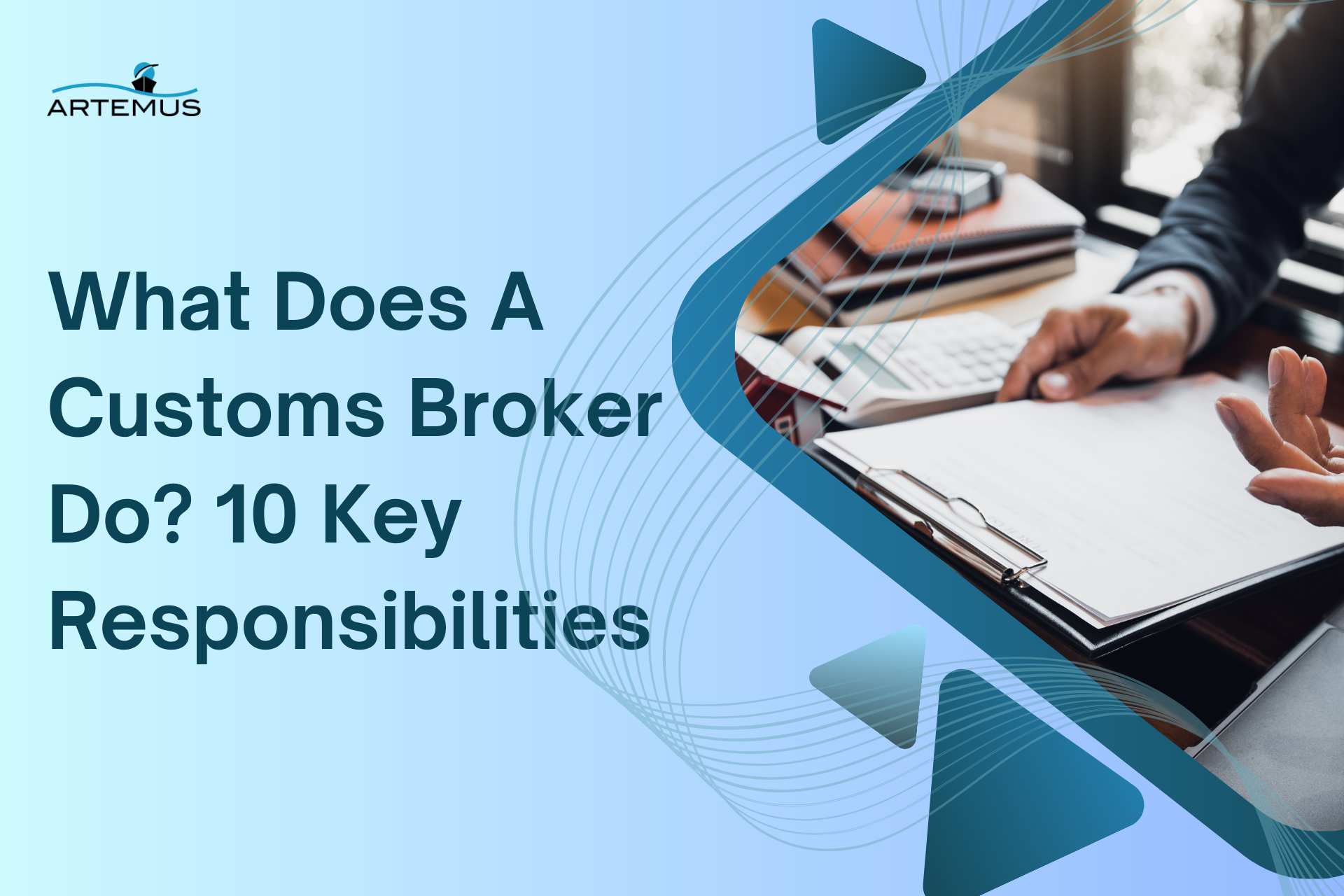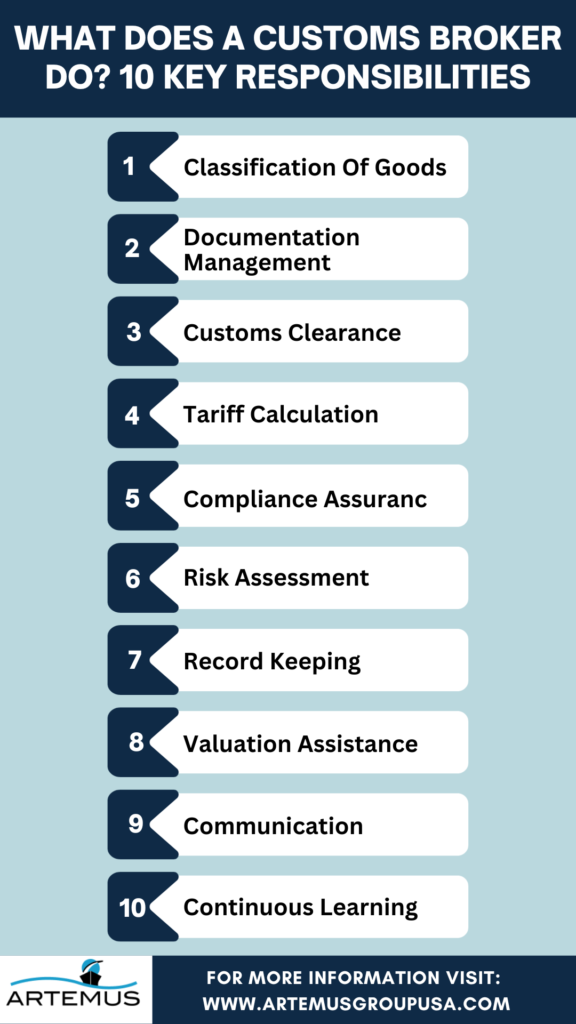
What Is Inbound Logistics & Outbound Logistics? A 2025 Guide
In the dynamic world of supply chain management, understanding the nuances of inbound and outbound logistics is crucial for operational

In our ever-connected world, international trade has become an integral part of our global economy. Products and goods flow seamlessly across borders, connecting businesses and consumers across continents. However, behind this intricate web of imports and exports lies a complex system of regulations, documentation, and compliance. This is where a customs broker steps in, serving as a vital link in the international trade chain, ensuring that goods cross borders smoothly and efficiently.
Have you ever wondered what a customs broker does, and how they play a pivotal role in facilitating international trade? In this blog, we will delve into the responsibilities and functions of customs brokers, shedding light on the often-unseen heroes of global commerce.
Moreover, Artemus Transportation Solutions offers state-of-the-art customs broker software designed to streamline the customs clearance process and simplify international trade for businesses of all sizes.
Table Of Contents
A customs broker is a professional intermediary who facilitates the import and export of goods by helping individuals and businesses navigate the complex and often daunting customs clearance process.
These experts are well-versed in customs regulations, tariffs, and documentation requirements, ensuring that shipments comply with legal and regulatory standards while minimizing delays and cost inefficiencies
By acting as a bridge between clients and government authorities, customs brokers play a crucial role in simplifying international trade, enabling the seamless movement of goods across borders.
Related: Customs Broker VS Freight Forwarder: 5 Key Differences

A customs broker plays a pivotal role in facilitating the complex process of importing and exporting goods across international borders. Their expertise and knowledge of customs regulations and procedures are essential for smooth and compliant trade transactions. Here are ten key responsibilities of a customs broker:
Customs brokers are responsible for meticulously classifying goods based on the Harmonized System (HS) code. Accurate classification is crucial because it determines the applicable customs duties, taxes, and trade regulations for each item. Brokers possess a deep understanding of these codes and stay updated on any changes or revisions to ensure correct classification.
The preparation and submission of extensive documentation are at the heart of a customs broker’s role. This includes invoices, bills of lading, certificates of origin, and various permits or licenses. They meticulously review, complete, and submit these documents to customs authorities, ensuring that all required information is accurate and in compliance with local and international laws.
Customs brokers act as intermediaries, representing importers and exporters in their dealings with customs authorities. They submit the necessary paperwork to gain clearance for the goods, which can involve extensive communication and negotiation with customs officials to address any issues or questions that may arise during the process.
Accurately determining the customs duties and taxes is a complex task. Customs brokers factor in multiple variables, such as the declared value of the goods, their origin, and any applicable trade agreements or preferences that might reduce or eliminate certain tariffs. This meticulous calculation helps clients understand the financial implications of their international trade transactions.
Customs brokers are well-versed in the ever-changing landscape of trade regulations. They advise clients on the legal requirements for their specific goods and help them navigate potential compliance pitfalls, ensuring that all transactions align with customs laws to avoid costly penalties or delays.
Customs brokers assess potential risks associated with importing or exporting certain goods. They analyze factors like embargoed countries, prohibited items, and the possibility of goods being flagged for inspection. By identifying and mitigating risks, brokers help clients minimize the likelihood of costly disruptions or penalties.
Accurate record-keeping is a vital aspect of customs brokerage. Brokers maintain thorough records of all import and export transactions for their clients. This not only ensures compliance but also assists clients in audits or investigations, offering a historical account of their trade activities.
Customs brokers help clients determine the correct customs value of their goods, taking into account various factors like packaging costs, royalties, and the value of assists (goods or services provided by the buyer to the seller). Accurate valuation is essential to prevent under or overpayment of customs duties and taxes.
Effective communication is key to the customs brokerage process. Brokers facilitate communication between various parties, such as customs authorities, freight forwarders, and clients. They ensure that all parties have the necessary information and documentation to streamline the movement of goods across borders.
Customs regulations and procedures are continually evolving. Customs brokers invest in ongoing education and training to stay updated on the latest changes in trade laws and procedures. This knowledge enables them to provide clients with the most current and efficient customs solutions while maintaining compliance with the law.
Related: Can A Customs Broker Be The Importer Of Record Legally?
Hiring a customs broker is a wise decision for individuals and businesses engaged in international trade. These professionals offer a range of services that can streamline the import and export process while providing several key benefits. Here are five significant advantages of hiring a customs broker:
Customs regulations and trade laws can be intricate and ever-changing. Customs brokers possess in-depth knowledge of these regulations, ensuring that all import and export activities comply with current laws and requirements. By keeping abreast of changes and understanding the nuances of trade compliance, they help clients avoid costly penalties and delays.
Managing customs procedures can be time-consuming and labor-intensive. Customs brokers handle the time-consuming paperwork, documentation, and communication with customs authorities, freeing up clients to focus on their core business activities. This efficiency can result in cost savings, as delays or errors in customs processes can lead to additional fees and storage charges.
Determining the correct customs duties and taxes for imported or exported goods can be a complex task. Customs brokers have the expertise to accurately calculate these fees, taking into account factors like the value, origin, and classification of the items. This precision helps clients understand and manage their financial obligations and can potentially reduce costs through duty minimization strategies.
Import and export activities come with inherent risks, including potential inspections, documentation errors, and compliance issues. Customs brokers help identify and mitigate these risks by offering guidance and proactive solutions. Their experience in navigating regulatory challenges ensures a smoother, less risky international trade process.
Customs brokers provide valuable advice on trade strategies, helping clients make informed decisions that align with their business goals. This includes optimizing supply chain logistics, taking advantage of trade agreements, and identifying potential cost-saving opportunities. Their insights can result in improved overall business profitability.
Related: Customs Broker Exam (CBLE): A Comprehensive 2024 Overview
Choosing the right customs broker is crucial for a smooth international trade experience. Consider these five crucial aspects:
Related: What Are The Likely Customs Broker Exam Pass Rate For 2024?
The main role of a customs broker is to streamline the movement of goods across borders by handling customs regulations and clearance processes for clients.
A customs agent is typically a government official responsible for enforcing customs laws, while a customs broker is a private-sector professional who assists clients in complying with those laws and clearing goods through customs.
You may need a customs broker if you’re involved in international trade and require assistance with customs regulations, documentation, and clearance processes.

In the intricate world of international trade, customs brokers stand as unsung heroes, ensuring the smooth flow of goods across borders. Their expertise in navigating the labyrinth of customs regulations, coupled with a dedication to cost-efficiency and compliance, is indispensable for businesses and individuals engaged in global commerce.
From duty minimization to expert guidance, customs brokers are your trusted allies in the world of cross-border transactions, making international trade more accessible, efficient, and compliant.
Related: Custom Broker Fees Explained: The Figures You Need To Know

In the dynamic world of supply chain management, understanding the nuances of inbound and outbound logistics is crucial for operational

In today’s interconnected world, businesses rely heavily on global trade to expand their markets, access new resources, and drive growth.

Importing goods for resale in the USA presents a lucrative business opportunity, but navigating the complexities of U.S. customs regulations,
Get In Touch
Artemus’ Software Solutions for ISF, AMS, Japan AFR, eManifest Canada, & Panama B2B filings.